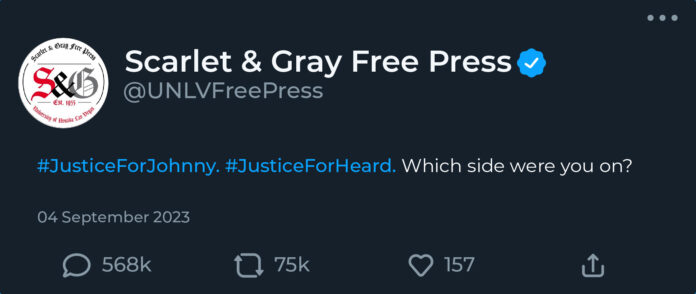Justice For Johnny. Justice For Heard. Which side were you on?
It’s been over a year since the first “Trial by TikTok” was broadcast live to the whole world, but is the public ready for a more nuanced conversation about the legal circus event? Well, Netflix thinks so.
The case, Depp v. Heard, and the speculation surrounding it, is examined in Emma Cooper’s three-part docuseries “Depp v. Heard.” Netflix aired the docuseries on August 16, and the relieving moments of silence on the internet were once again in uproar when pro-Depp and pro-Heard fans attacked Netflix and Emma Cooper.
The docuseries received a lot of heat from viewers regarding the show’s futility. After watching the three-part documentary I’m left wondering was the trial actually shallow or are we the shallow ones?
The defamation trial came after Heard wrote an op-ed in The Washington Post in 2018 alleging she was a victim of abuse after her divorce from Depp. In 2020, Depp sued The Sun for an article titling him as a “wife beater” but lost. In Fairfax County, VA. Circuit Court, Depp sued Heard for defamation on April 11, 2022.
The case ended on June 1, 2022, with the jury finding Heard’s statements in The Washington Post to be false and defamatory to Depp’s public image. However, the jury also found that Depp’s lawyer, Adam Waldman, defamed Heard on one count in her countersuit. The case resulted in Depp being awarded $15 million in damages and Heard being awarded $2 million in damages.
If you were consciously breathing in 2022, you knew about the unfolding battle between Depp and Heard. The trial was such a historical event in pop culture that even if you weren’t on the internet to see the myriad of viral memes and parodies of the case, you would understand the punchline of the “mega pint.” To capture the intensity of such a hair-pulling and nail-biting event of this magnitude into a three-hour documentary is no easy excursion to take on, and for that, I applaud Cooper’s conviction.
The docuseries highlights the three famous incidents from the case: feces in the bed, the sliced fingertip, and the airplane fight. Cooper structures the docuseries to show Depp’s and Heard’s respective takes on the incidents side by side. Many pro-Depp fans argue that Cooper’s docuseries was pro-Heard, but I disagree.
The documentary did well to show both sides of the trial, despite content supporting Heard’s side being much more scarce than Depp’s overwhelming fan base. Displaying the internet reacting in real-time to the trial, a wide range of Depp-loving personalities are shown throughout the intercut as passionate female fans, obnoxious individuals wearing Deadpool masks, or those prone to yelling incredulously and profane things into their webcams take up the screen; the pro-Heard side isn’t conveyed as lively, but in brief clarifications of white text on a black screen or from reluctant interviewees on a podcast. If anything, accusations of Cooper’s documentary favoring a side should be muted when compared to her conspicuous opinion of the online torrent surrounding the trial.
Throughout the documentary, Cooper’s opinion on the current media is expressed. The intercuts of reenactments of “ordinary people ” glued to their phones watching the trial while doing “ordinary things”, laughable scenes of actual people on the internet reacting to the trial, and the affair of TikTokers and Youtubers making monetary gains from the trial was all intentional. These scenes were not filler but a contemporary form of introspection. Cooper was trying to hold a mirror up for the audience, so that we may observe the poisoning online spaces we are succumbing ourselves to.
The docuseries may have lacked more professional discussion but the docuseries was structured to be observational not analytical, and the documentary shouldn’t be judged on things it wasn’t trying to do. Cooper had a message throughout the documentary and it was conveyed if you were willing to listen.
At the end of the three-part docuseries, the camera cuts to a cell phone showing the opening credits of “Depp v. Heard.” As someone who watched the documentary on her phone as well, I can only laugh at the parallelism. We are all implicated, including Cooper, in the ouroboros of the toxic online-driven society we are living in today.

